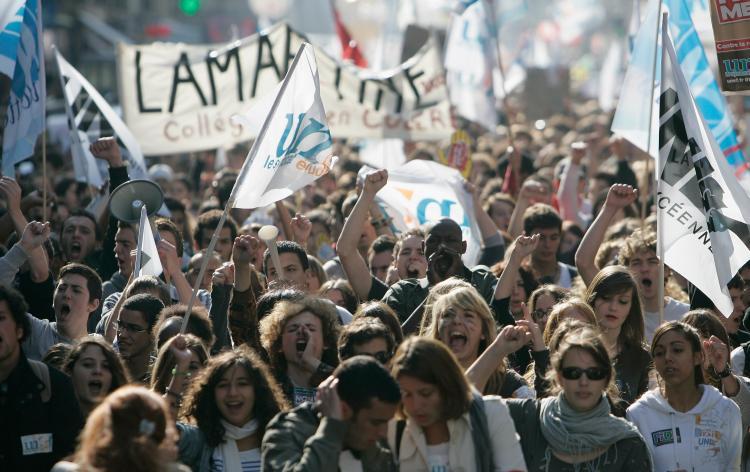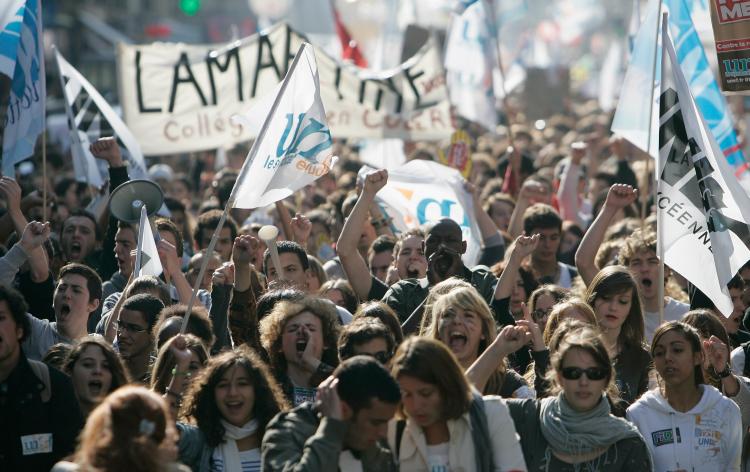PARIS—Today marked almost a second birth for protests organized by French labor unions. After the less-than-average success of Sept. 23 actions that made many think the opposition movement would quickly end, nearly 3.5 million demonstrators marched on the streets of main cities in France on Oct. 12, sending a strong message to the French government.
In Paris, banners and slogans were all about criticizing President Nicolas Sarkozy in the two rallies that joined together in the late afternoon on Place de la Bastille—a heavy revolutionary symbol of citizens defeating state power.
In-between the second and last of three national strike days since the beginning of September, unions obtained a key support: students, both university and middle school, ranging from 15 to 18 years of age. Those are certainly the most feared participants of protests for any government given their capacity to maintain strong mobilization over time.
UNEF, the main union of university students, announced that 150,000 students participated in the Oct. 12 protests and said it “shows youths are largely opposed to the reform as promoted by the government.”
The reforms, says UNEF, “would close many doors to them in terms of accessing a first job, and would tomorrow have them working longer without any guarantee that they would receive a full pension.”
The French pension system currently sets the minimal age of retirement at 60. The government proposes to raise it to 62, while raising the age from 65 to 67 to qualify for a full pension. In addition, the reforms will lengthen the minimum number of years at work from 35 to 37.5.
Opposition says the reforms are unfair because it puts more pressure on people with the lowest incomes—those who started working at a young age and did not receive higher education.
While everyone recognizes that the pension system cannot remain unchanged in the face of higher average life expectancy, opinions vary as to how to tackle the issue. Opponents to the reform also criticize the government for trying to accelerate adoption of the new law by using the so-called “emergency procedure” in Parliament, allegedly doing everything they could to prevent parliamentary debate.
“This is our biggest day since the beginning of the process,” said Bernard Thibault, from the far-left Confédération Générale du Travail (CGT) labour union. “Government has to realize that the popular movement is deep and enjoys strong support from the general population. … The only way is to open negotiations with unions.”
And for François Chereque, general secretary of the CFDT union, the government “needs to answer to the growing mobilization and choose the path of dialogue.”
Chereque says the reform will not allow fiscal balance to be achieved until 2018 and needs to be debated again. “If the government decides to maintain its position, it will likely provoke a radicalization of the movement.”
The French Ministry of Interior however contested the number of participants, saying it was in fact 1.2 million. This is in any case a 15 percent to 30 percent increase in participants as compared to Sept. 23.
On Oct. 12, 11 out of 12 fuel refineries were on strike, a strong indicator that strikers could launch a strategy of organized fuel shortage and long-term strikes in transportation and administration to force the government to step back. This is the way strikers blocked previous attempts of reform, for instance in 1995 when three weeks of strikes paralyzed the country.
Additionally, student involvement has always been a marker of radicalization.
According to a recent BVA opinion poll, two-thirds of French citizens hope that the opposition to the reform of the pension system will get stronger. Calls for a permanent strike are heard in different sectors. In train transportation for example, a strike will begin on Oct. 13. And in many other places, including in the private sector, new actions are being prepared.
New protests are being organized throughout France on Oct. 16.
In Paris, banners and slogans were all about criticizing President Nicolas Sarkozy in the two rallies that joined together in the late afternoon on Place de la Bastille—a heavy revolutionary symbol of citizens defeating state power.
In-between the second and last of three national strike days since the beginning of September, unions obtained a key support: students, both university and middle school, ranging from 15 to 18 years of age. Those are certainly the most feared participants of protests for any government given their capacity to maintain strong mobilization over time.
UNEF, the main union of university students, announced that 150,000 students participated in the Oct. 12 protests and said it “shows youths are largely opposed to the reform as promoted by the government.”
The reforms, says UNEF, “would close many doors to them in terms of accessing a first job, and would tomorrow have them working longer without any guarantee that they would receive a full pension.”
The French pension system currently sets the minimal age of retirement at 60. The government proposes to raise it to 62, while raising the age from 65 to 67 to qualify for a full pension. In addition, the reforms will lengthen the minimum number of years at work from 35 to 37.5.
Opposition says the reforms are unfair because it puts more pressure on people with the lowest incomes—those who started working at a young age and did not receive higher education.
While everyone recognizes that the pension system cannot remain unchanged in the face of higher average life expectancy, opinions vary as to how to tackle the issue. Opponents to the reform also criticize the government for trying to accelerate adoption of the new law by using the so-called “emergency procedure” in Parliament, allegedly doing everything they could to prevent parliamentary debate.
“This is our biggest day since the beginning of the process,” said Bernard Thibault, from the far-left Confédération Générale du Travail (CGT) labour union. “Government has to realize that the popular movement is deep and enjoys strong support from the general population. … The only way is to open negotiations with unions.”
And for François Chereque, general secretary of the CFDT union, the government “needs to answer to the growing mobilization and choose the path of dialogue.”
Chereque says the reform will not allow fiscal balance to be achieved until 2018 and needs to be debated again. “If the government decides to maintain its position, it will likely provoke a radicalization of the movement.”
The French Ministry of Interior however contested the number of participants, saying it was in fact 1.2 million. This is in any case a 15 percent to 30 percent increase in participants as compared to Sept. 23.
On Oct. 12, 11 out of 12 fuel refineries were on strike, a strong indicator that strikers could launch a strategy of organized fuel shortage and long-term strikes in transportation and administration to force the government to step back. This is the way strikers blocked previous attempts of reform, for instance in 1995 when three weeks of strikes paralyzed the country.
Additionally, student involvement has always been a marker of radicalization.
According to a recent BVA opinion poll, two-thirds of French citizens hope that the opposition to the reform of the pension system will get stronger. Calls for a permanent strike are heard in different sectors. In train transportation for example, a strike will begin on Oct. 13. And in many other places, including in the private sector, new actions are being prepared.
New protests are being organized throughout France on Oct. 16.







